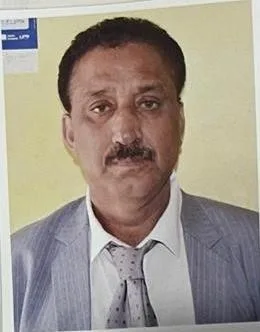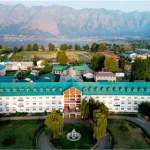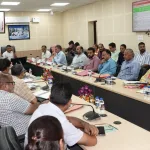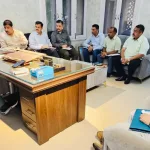JAMMU, SEPT 4: Former parliamentary candidate and Kashmiri Pandit leader, Dilip Kumar Pandita, has voiced serious concern over the ongoing NAFSA form data punching exercise being carried out at migrant zone offices in Jammu. In a strongly worded statement, Pandita accused the authorities of attempting to erase the displacement identity of the Kashmiri Pandit community by omitting their original Valley-based residential addresses from official records.
According to Pandita, the ongoing data entry operation, supervised by the Directorate of Food, Civil Supplies & Consumer Affairs, is replacing migrants’ original addresses in the Kashmir Valley with Aadhaar-linked addresses from their current locations in Jammu. This change, he warned, is not a clerical oversight but a deliberate move that threatens to undermine the decades-long status of Kashmiri Pandits as displaced persons.
“The original residential addresses of Kashmiri migrants are missing from the database. Instead, the Aadhaar-linked addresses from Jammu are being reflected as both present and permanent addresses,” Pandita said. “This amounts to a systematic attempt to dilute our migration status and, by extension, our identity as a community in exile.”
Expressing deep anguish, Pandita called the move an institutional betrayal. He said that by facilitating such changes, the food and supplies department risks becoming a tool in implementing a silent policy aimed at ending the migration status of Kashmiri Pandits without due process, consultation, or compensation. He termed the development a “grave concern not just for migrants, but for the conscience of the nation.”
Referring to the community’s 35 years of displacement following the mass exodus of the 1990s, Pandita stressed that any attempt to erase their original addresses is akin to erasing their history and trauma. He emphasized that without recognition of their place of origin in the Valley, the migrant identity of the community stands on the verge of being bureaucratically dissolved.
“This move is not just about data. It is an attempt to write off our suffering, ignore our exile, and question our belonging,” Pandita said. “After decades of trauma and struggle, this amounts to betrayal.”
He further said that the action, if not reversed, could have serious implications on future rehabilitation, compensation, and the community’s constitutional claims as migrants. Describing it as “an attack on our very existence,” Pandita appealed to the government, civil society, and media to intervene urgently before what he called “irreparable damage” is done.
Calling for immediate corrective measures, Pandita urged the government to halt the current punching exercise, restore Valley-based addresses in the official database, and resume the process only after ensuring that the migration status of Kashmiri Pandits is fully safeguarded.






